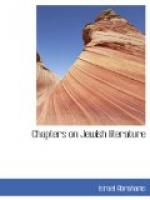BIBLIOGRAPHY
JEHUDA HALEVI.
Graetz.—III, II.
J. Jacobs.—Jehuda Halevi, Poet and Pilgrim
(Jewish
Ideals, New York, 1896, p. 103).
Lady Magnus.—Jewish Portraits (Boston, 1889), p. 1.
TRANSLATIONS OF HIS POETRY by Emma Lazarus and Mrs.
Lucas
(op. cit.): Editions of the
Prayer-Book; also J.Q.R.,
X, pp. 117, 626; VII, p. 464; Treasurers
of Oxford (London,
1850); I. Abrahams, Jewish Life in
the Middle Ages, chs. 7, 9
and 10.
HIS PHILOSOPHY: Specimen of the Cusari,
translated by A.
Neubauer (Miscellany of the Society
of Hebrew Literature,
Vol. I). John Owen.—J.Q.R.,
III, p. 199.
CHARIZI.
Graetz.—III, p. 559 [577]
Karpeles.—–Jewish Literature and
other Essays,
p. 210 seq.
M. Sachs.—Hebrew Review, Vol. I.
CHAPTER XIII
MOSES MAIMONIDES
Maimon, Rambam = R.
Moses, the son of Maimon, Maimonides.—His
Yad Hachazaka and Moreh
Nebuchim.—Gersonides.—Crescas.—Albo.
The greatest Jew of the Middle Ages, Moses, the son of Maimon, was born in Cordova, in 1135, and died in Fostat in 1204. His father Maimon was himself an accomplished scientist and an enlightened thinker, and the son was trained in the many arts and sciences then included in a liberal education. When Moses was thirteen years old, Cordova fell into the hands of the Almohades, a sect of Mohammedans, whose creed was as pure as their conduct was fanatical. Jews and Christians were forced to choose conversion to Islam, exile, or death. Maimon fled with his




